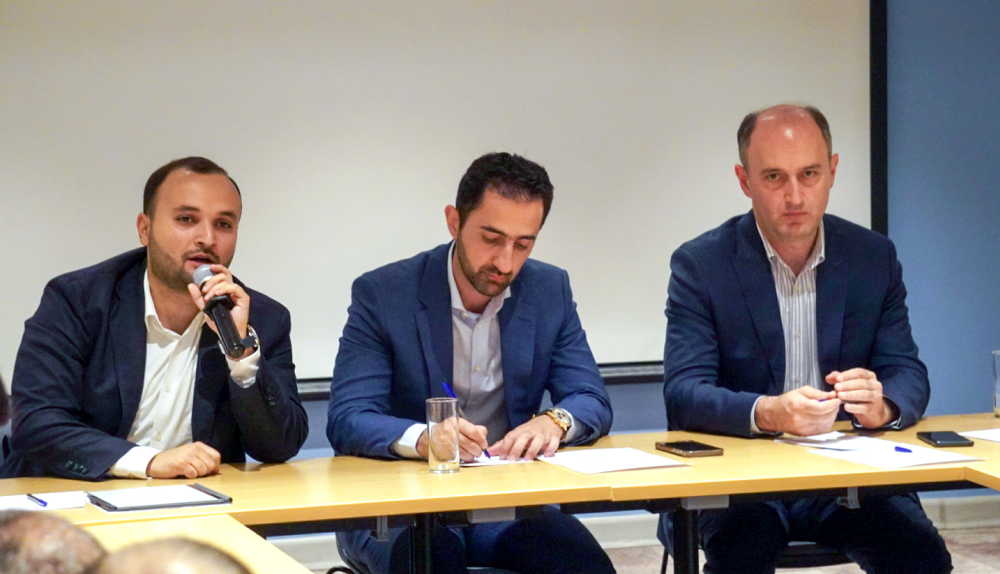Legislative changes in the solar sector could have serious consequences for the development of the industry, the country’s energy stability, and Armenia’s overall economy, stated the leaders of the country’s leading solar companies today.
More than 20 companies active in the solar energy sector participated in a discussion organized at the initiative of the major industry stakeholders. These companies expressed concern about upcoming developments and showed readiness to engage in the work of expert groups.
“With this initiative, we urge policymakers to involve solar companies in addressing the existing systemic issues, because our highest goal is to build a stable and secure energy system, and we cannot succeed in this without each other,” said Tigran Okhanyan, founder of a solar company.
The solar energy sector in Armenia has grown rapidly in recent years thanks to active state support policies, subsidy programs, and other initiatives. Today, solar plants produce more than 13% of the country’s electricity. During summer daytime hours, solar power accounts for up to 85% of the country’s electricity generation. However, excess electricity during daytime, limited infrastructure capacity, and inefficient demand management have posed serious challenges for the sector.
“We have now reached a point where Armenia’s energy system may face serious security and stability issues manifesting as overloads, failures, power outages, and other complications. Acknowledging the seriousness of the problem, we call on all stakeholders’ attention and express our readiness to actively participate in discussions and present our solutions package,” said Hayk Shekyan, founder and CEO of a solar company, emphasizing that the solar sector is one of the most advanced branches of Armenia’s economy and that development should not be halted, especially given the availability of effective international experience that can be adapted locally.
Currently, about 70 companies operate in Armenia’s solar energy sector, providing over 3,000 jobs. In 2024 alone, the state budget received 4.1 billion AMD in taxes. Halting sector development would lead to job losses for many people.
A successful state subsidy program has been operating for several years, providing preferential loans for acquiring solar plants — in regional communities, for example, loans are offered with interest rates as low as 0%. Thanks to this opportunity, many companies and households have transitioned to solar energy. However, this program is likely to end soon.
“After the subsidy program ends, most solar companies will face closure risks, and some will consider changing their profile. We must not allow an already established sector to decline. The subsidy program could be replaced with a mechanism similar to income tax return, allowing citizens to acquire solar plants while directing their income tax toward loan interest payments. This could be quite an effective solution, but its implementation requires time and preparation,” stressed solar company founder Hovhannes Aristakesyan.
The challenges emerging alongside renewable energy development are not unique to Armenia but are characteristic of all countries that have already undertaken the energy transition.
“Armenia does not face a dilemma of whether to transition to renewable energy because we have already made that transition. Now, we must decide how quickly we can build a sustainable, independent, and future-oriented economy. Time is not on our side. The window of opportunity is narrowing. The government and business leaders must be decisive and collaborative,” said Hayk Shekyan.
According to industry stakeholders, there are various ways to solve these challenges — wide application of energy storage (from households to large industrial systems), revising tariff policies, promoting daytime electric vehicle charging, creating large-scale energy consumption centers (e.g., data centers or mining farms), developing export directions, and continuing the subsidy program.
“It is cheaper and more efficient to preserve what has already been created than to build anew. The state subsidy program must continue, focusing on introducing other energy-saving devices as well as solar plants operating in combination with energy storage systems,” said Tigran Okhanyan.
Leading companies in the sector invite the government to intensive dialogue, expressing readiness to actively participate both in problem analysis and in developing solutions. They plan to establish an appropriate association, emphasizing that sector development is vital to reduce dependence on imported energy carriers, ensure balanced economic growth, create jobs and added value, and fulfill the country’s obligations under the SEPA framework.








